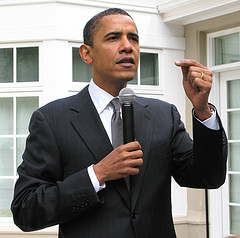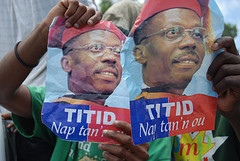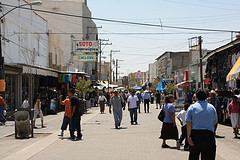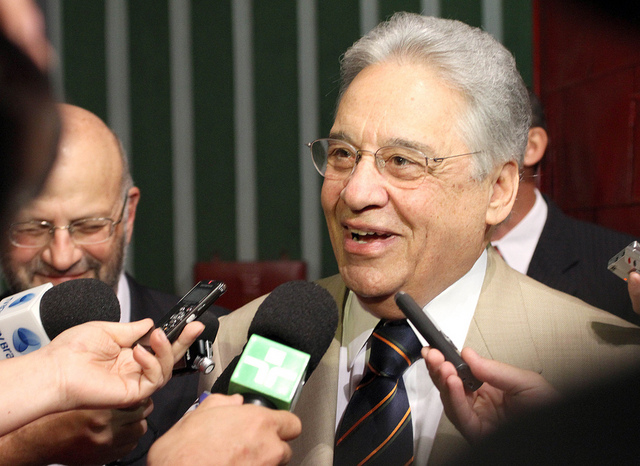
Latin America: Week in Review, Mexico
Mexico’s Carstens Meets With Geithner; Says Lagarde Appointment Could Be “Conflict of Interest”
June 14, 2011 By Staff
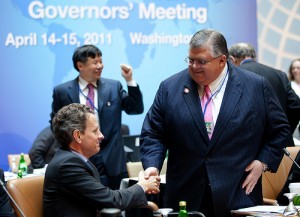
U.S. Treasury Secretary Timothy Geithner (left) shakes hands with Mexican Central Bank Governor Agustín Carstens (right).
Today in Latin America
Top Story — Mexico’s central bank head Agustín Carstens was in the United States Monday to meet with Treasury Secretary Timothy Geithner in an effort to gain Washington’s backing in his bid to chair the International Monetary Fund (IMF).
Carstens, who along with France’s Christine Lagarde is vying for the position vacated by Dominique Strauss-Kahn, said that Europe’s control over the IMF is outmoded and it needs a new perspective on how to handle government debt and other economic problems that Europe currently faces.
Mexico’s bank chief was, however, realistic about his chances of obtaining the position at the IMF. Carstens said that the combination of 65 years of European leadership and the strong feeling in Europe that the IMF needs a European in charge stack the cards against him.
“That makes it more difficult. I’m not fooling myself. It’s like starting a soccer game with a 5-0 score,” he said during remarks at the Peterson Institute for International Economics in Washington D.C.
The U.S. has so far been noncommittal in the IMF race, but with the country holding 16 percent of the voting shares on the Fund’s executive board and a large leadership position its decision carries a good deal of weight. After a private meeting with Carstens, Geithner did not comment on backing any of the candidates.
“The secretary thinks Governor Carstens has a strong mix of financial talent and political skills, making him an exceptionally capable candidate to head the IMF,” The Treasury Department said in a statement.
For its part, the U.S. seems to be split between its own support of better representation for emerging markets and its need to maintain a hold on its appointment of the No. 2 spot at the IMF and its selection of the head of the World Bank.
While Carstens admitted he needed to fight an uphill battle, he didn’t pull any punches during his talk in Washington. He said that the European dependence on the IMF to bail out several of its members could be a challenge to Lagarde’s ability to take a hard stance as the Fund’s leader.
“I also think there could be a conflict of interest,” he said, accoding to The Montreal Gazette. “We’d have a situation where the borrowers dominate a creditor institution. I think that’s an issue we should consider.”
Carstens, who assumed control of Mexico’s central bank (Banco de México) in January of 2010, bills himself as the champion of the emerging-markets nations and believes theses markets need to play a much larger role in setting the agenda of the IMF.
He earned a doctorate in economics from the University of Chicago before becoming Banco de México’s International Treasurer in 1989. He has spent most of his professional career at Mexico’s central bank, but was also a deputy managing director at the IMF for three years before becoming Mexico’s finance minister in 2006.
Bank of Israel Governor Stanley Fischer also announced his intention for the job, as the deadline for nominations closed Friday.
Just Published at the Latin America News Dispatch
- New York politicians and immigration activists rallied on the steps of New York City Hall to try and save the Immigrant Opportunities Initiative. Staff Writer Mari Hayman reported from the scene.
- Contributing photographer John Sevigny left Mexico after a terrifying night of gunfire and grenades in Saltillo. Read his personal account here.
Headlines from the Western Hemisphere
North America
- The U.S. Supreme Court upheld a ruling Monday against a Mexican-born man who challenged a citizenship law that treats men and women differently.
- The positive drug tests of five Mexican soccer players has been linked to meat containing the banned steroid clenbuterol.
- Hundreds of women in Mexico City marched through the streets Sunday to protest the blame and shame assigned to victims of sexual attention or assault.
Caribbean
- A well-known Haitian banker credited with turning around a once struggling state-owned bank was fatally shot inside his home after armed men broke in Sunday night, Haitian police said.
- President Barack Obama makes a rare presidential visit to Puerto Rico on Tuesday, spending about five hours there on a trip aimed as much at Puerto Ricans on the mainland as those on the island.
Central America
- Costa Rican President Laura Chinchilla signed into law Monday a free trade accord with China, making 70 percent of the countries exports fall under free trade agreements.
- Human Rights activists and environmentalists are blaming drug cartels for destroying Guatemala’s rain forests and threatening biodiversity and ancient Mayan ruins.
- The roof of a church collapsed during a service in a city in central El Salvador and injured at least 20 people.
- A British man, who faked his own death in a car accident in Honduras to collect insurance money, admitted to his fraud.
- Federal officials say they found a video of the decapitation of a Guatemalan prosecutor in the cell phone of an alleged Zetas cartel member captured earlier this month.
Andes
- Venezuelan officials will once again ration electricity in a repeat of last year with a new set of measures announced Monday that include steep price increases as penalties for customers who fail to conserve power.
- A planned corporate merger between Peru and Colombia’s stock markets has been put on hold until Peru’s President-elect Ollanta Humala has a chance to look over the proposal, the two exchanges said in a joint press release Monday.
- Peruvian President Alan García’s plans to build the world’s tallest Christ statue in Lima has angered local residents who fear the soaring monument will mar the city’s skyline.
- Venezuelan President Hugo Chavez said from a Havana hospital that he is in possession of his “full faculties” after emergency surgery for a pelvic abscess he underwent at a Cuban hospital.
Southern Cone
- Volcanic ash from Chile’s Puyehue-Cordon Caulle eruption last week continued to ground flights Monday, stretching 6,000 miles and as far away as New Zealand and Australia.
- South American soccer governing body CONMEBOL said the Chilean volcanic eruption could prevent flights from landing in Argentina for the Copa America tournament.
- Brazil’s military awarded a $5 million contract to a subsidiary of Spain’s Indra for satellite communication systems.
- A joint study by UNICEF-Argentina and FLASCO (the Latin-American School of Social Studies) revealed that bullying is increasingly becoming a problem in public and private schools in Argentina.
Image: International Monetary Fund @ Flickr.

